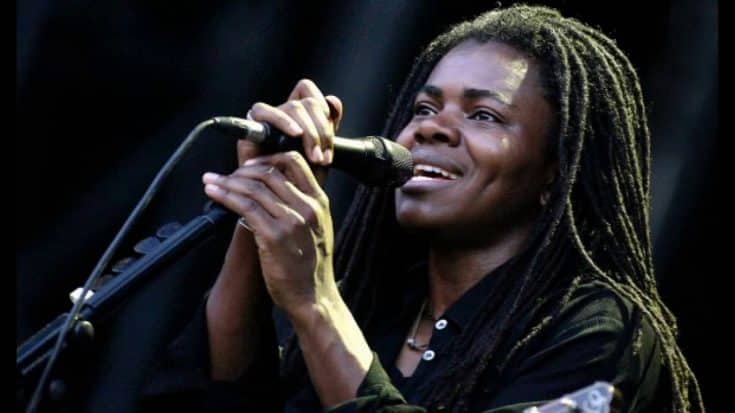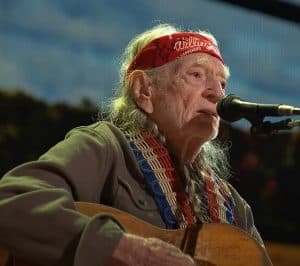10 Tragic Facts About Tracy Chapman’s Life

via Famous Biographies / Youtube
Tracy Chapman exploded onto the music scene with a force rarely seen. Her 1988 self-titled debut album, featuring the iconic “Fast Car”, became a global phenomenon, topping charts worldwide and selling millions of copies. Chapman’s raw talent and introspective lyrics resonated with millions, solidifying her place as one of the most respected singer-songwriters of our generation.
Despite her immense success, Chapman has always shunned the spotlight. Unlike many artists who thrive on fame, Chapman retreated from the celebrity world, leaving fans to wonder about the life behind the music. Her recent, rare appearance at the 2024 Grammys performing “Fast Car” alongside Luke Combs ignited a renewed interest in the artist.
With limited public appearances and no new music since 2008, many questions remain about Tracy Chapman, the enigmatic woman who continues to captivate audiences with her music. This article delves into the lesser-known aspects of Chapman’s life, offering a glimpse into the story of the artist who chooses her privacy over the flashbulbs of fame.
She had a rough start in Ohio
Tracy Chapman’s calm and gentle demeanor doesn’t reveal the challenges she faced in her early life. Born in Cleveland in 1964, Chapman was raised in a single-parent household. While her mother nurtured her musical interests with a ukulele (though sadly stolen), their working-class background meant relying on welfare.
However, a bigger storm was brewing. When Ohio integrated schools, it brought racial tensions to a head for Chapman. Bullied and even threatened with a gun by white students, she described her high school experience as being in the middle of a “race riot”. This period of trauma would eventually push her out of Ohio.
One of her songs was about her experiences in a boarding school
Escape from violence in Ohio came in the form of a scholarship to a prestigious Connecticut boarding school for Tracy Chapman. While it offered a quality education and nurtured her musical aspirations (though her dream of becoming a veterinarian faded), the experience wasn’t all sunshine and roses. As a young teenager surrounded by privileged students, Chapman felt a stark contrast to her own working-class background.
This social divide, as she explained in a 1986 interview, fueled her political awakening and songwriting. The frustration with elitism Chapman encountered in her first year even led to the creation of one of her most iconic songs, “Talkin’ ’bout a Revolution”, written at the tender age of 16. This anthem against social injustice would become a cornerstone of her debut album and a fan favorite.
Her early team suffered both triumph and loss
While a student at Tufts, Tracy Chapman’s talent blossomed on the Boston folk scene. Fellow student Brian Koppelman, impressed by her performances, introduced her to his father, music industry giant Charles Koppelman. This connection led to her signing with Elliot Roberts, a veteran manager with a stellar folk music background (having worked with Neil Young and Joni Mitchell). Roberts seemed the perfect fit to navigate Chapman’s unique blend of tenderness and political commentary through the late-80s music scene, dominated by synth-pop and hair metal.
However, tragedy struck early in her career. Chapman was set to record her debut album with legendary producer Alex Sadkin, known for working with top pop acts. Sadly, Sadkin died in a car accident right before recording began. Thrown into crisis, Chapman was assigned a new, unknown producer. Reflecting on this period in a 2008 interview with Sublime Magazine, she stated, “Had that record come out, I wouldn’t be talking to you today,” highlighting the potentially disastrous turn her career could have taken.
https://twitter.com/The80sDiary/status/1774034557953610204
Her big break was at Nelson Mandela’s 70th tribute concert
Even the most talented artists need a lucky break, and for Tracy Chapman, that arrived in 1988. Nelson Mandela, the imprisoned leader of South Africa’s anti-apartheid movement, was turning 70. To raise awareness and pressure for his release, a massive tribute concert was organized at London’s Wembley Stadium, featuring global superstars. Though a relative newcomer, Chapman was included on the bill, unsure of her exact performance time according to a later interview with Sublime Magazine.
Fate intervened when Stevie Wonder, scheduled for a prime slot, couldn’t perform due to technical difficulties with his electronic set. Chapman was thrust into the spotlight, her acoustic guitar a stark contrast to the planned performance. Her raw talent stole the show, captivating the global audience tuned in. This unexpected opportunity skyrocketed her career, with fans worldwide seeking out her debut album, propelling her to instant stardom.
Her music wasn’t played much on black radio stations due to her genre
Tracy Chapman’s meteoric rise continued with a triumphant Grammy night in 1989, scoring wins for Best Contemporary Folk Recording, Best Female Pop Vocal Performance, and Best New Artist. However, despite her undeniable talent and historical role in the Mandela tribute, her success wasn’t universally celebrated.
Black radio stations, a crucial platform for Black artists, were reportedly hesitant to play her music. Disappointed, Chapman spoke to The San Diego Union-Tribune in 1990, highlighting the genre limitations these stations imposed. She argued that restricting airplay based on race and genre disserved listeners by limiting their exposure to diverse music. Chapman compared herself to Jimi Hendrix, whose rock leanings challenged expectations. “I have a lot of respect for him,” she said, “doing his own thing, instead of what was expected of Black musicians at the time.”
https://twitter.com/MissChatJOY/status/1665150124828377091
Despite her serious songs, she was actually a chill person
Tracy Chapman’s rise to fame in the late 1980s was unexpected. Her introspective lyrics and folk style stood out in a world dominated by pop and hair metal. However, her success sparked a renewed interest in singer-songwriters with a message.
Despite the seriousness of her music, Chapman herself isn’t all about melancholia. In a 1990 interview with The San Diego Union-Tribune, she challenged the perception that she spends her days dwelling on the world’s problems. The article noted her easy laugh throughout the interview, and clips from both her pre-fame and multi-Grammy-winning days show a woman who readily smiles and shares jokes, often at her own expense.
https://twitter.com/rocknrollgarag1/status/1773908005609947226
Critics and fans thought she had reached her creative end in early 1990s
Following the massive success of her debut album, Tracy Chapman faced the pressure of a sophomore effort. Crossroads, released in 1989, received positive reviews but couldn’t match the critical acclaim of Tracy Chapman. Commercially, it also fell short.
This led Chapman to take more time with her third album, Matter of the Heart (1992). This record marked a stylistic shift, incorporating elements of alternative rock and straying from her signature acoustic folk sound. While well-received, it alienated some fans and commercially underperformed, peaking at No. 53 on the Billboard 200. This period of experimentation, coupled with a three-year hiatus from the public eye, led some to believe Chapman might be reaching a creative dead end.
She is a very private person
Tracy Chapman’s music resonates with millions due to its dual focus on personal emotions and social issues. She readily shares her political views through her songwriting, however, her songs hinting at love and relationships remain shrouded in mystery. Despite the confessional nature of these lyrics, Chapman has always maintained a clear separation between her art and her personal life.
“I’m just a really private person,” she stated in a 1988 Rolling Stone interview. She longs for anonymity offstage, prioritizing privacy over public scrutiny. While author Alice Walker has claimed a romantic relationship with Chapman in the 1990s, the singer has never addressed the topic, opting to keep her personal life, including her sexuality, out of the public eye.
https://twitter.com/FemmeItForward/status/1774176074257289456
Her recent resurgence via country music was a full circle moment
Tracy Chapman found herself back in the spotlight in 2023 thanks to a country music cover. North Carolina’s Luke Combs released his version of “Fast Car” as the second single from his album Gettin’ Old, and it became a runaway success. Topping the country charts, reaching number two on the Billboard Hot 100, and winning the Country Music Association award for Song of the Year, the cover revitalized interest in Chapman’s original.
This wasn’t just a random pairing. Combs has long been a vocal admirer of Chapman, especially “Fast Car”. In his acceptance speech for the CMA award, Combs expressed his gratitude to Chapman “for writing one of the best songs of all time,” revealing it was his favorite song at the tender age of four. The success also made history, with Chapman becoming the first Black woman to top the country chart with a solo writing credit. Interestingly, Chapman’s connection to country music runs deeper than many realize. In an NPR interview, she admitted her early inspiration to play guitar might have stemmed from watching Hee Haw, a classic country music variety show, as a child.
She once sued Nicki Minaj and won
Tracy Chapman, known for her modest and unpretentious demeanor, which contrasts sharply with the flamboyant nature of many contemporary pop icons, found herself in a legal battle in 2018. She took a stand against Nicki Minaj, the renowned “Pink Friday” rapper, by filing a lawsuit. The case stemmed from Minaj’s unauthorized use of Chapman’s 1988 hit “Baby Can I Hold You” in her track “Sorry”, which was inadvertently released on DJ Funkmaster Flex’s website. Despite the removal of the song following its leak, Chapman pursued legal action, prompted by a previous denial of sample clearance by her team.
Chapman’s stance was vindicated in 2021 when a judge ruled in her favor, ordering Minaj to pay $450,000 in damages. This decision came after Minaj’s representatives argued that no copyright infringement had occurred. Chapman’s statement, conveyed through her representative, underscored her consistent refusal to grant permission for the use of her song. She emphasized her commitment to safeguarding her creative work, having never sanctioned her music for sampling or requested a sample herself.
Her recent Grammys performance was a very rare treat
Tracy Chapman’s music has experienced a resurgence thanks to Luke Combs’ hit cover of “Fast Car”. This led to a new generation of fans discovering Chapman’s work, and both old and new devotees were thrilled to see her take the stage at the 2024 Grammys for a duet with Combs. It was hailed as a highlight of the night.
However, for many of these new fans, this performance might be their first exposure to Chapman. They may not realize how uncommon such an appearance is from the multi-Grammy-winning artist. Chapman hasn’t released a studio album since 2008 and hasn’t toured since 2009. Her televised appearances over the past 15 years can be counted on one hand. While her Grammys performance has seen a surge in popularity for her original “Fast Car”, it remains to be seen if this will lead to a return to recording and touring as she enters her sixth decade.














